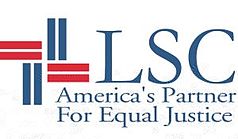Legal Services Corporation
 |
|
| Founded | July 25, 1974 |
|---|---|
| Founder | United States Congress |
| Type | 501(c)(3) |
| Focus | Promoting equal access to justice and providing grants for high-quality civil legal assistance to low-income Americans |
| Location | |
| Origins | LSC Act of 1974 |
|
Area served
|
United States |
| Method | Many state-level grantee programs |
|
Key people
|
|
| Expenses | $375 million budget |
| Slogan | America's Partner for Equal Justice |
| Website | http://www.lsc.gov/ |
The Legal Services Corporation (LSC) is a publicly funded, 501(c)(3) non-profit corporation established by the United States Congress. It seeks to ensure equal access to justice under the law for all Americans by providing civil legal assistance to those who otherwise would be unable to afford it. The LSC was created in 1974 with bipartisan congressional sponsorship and the support of the Nixon administration, and is funded through the congressional appropriations process.
LSC has a board of eleven directors, appointed by the President of the United States and confirmed by the United States Senate, that set LSC policy. By law the board is bipartisan; no more than six members can come from the same party. LSC has a president and other officers who implement those policies and oversee the corporation's operations.
For Fiscal Year 2015, LSC had a budget of $375 million to fund civil legal aid. LSC is the largest single funder of civil legal aid in the country, distributing more than 90 percent of its total funding to 134 independent nonprofit legal aid programs.
LSC is one of the organizational descendants of the former Office of Economic Opportunity (OEO). The Economic Opportunity Act of 1964, a key part of President Lyndon B. Johnson's Great Society vision, established the OEO. From 1965 on, starting with a budget of $1 million, the OEO created 269 local legal services programs around the country, such as California Rural Legal Assistance, which made a name for themselves suing local officials and sometimes stirring up resentment against their federal funding.
By the early 1970s the Nixon administration began dismantling the OEO; funding for legal services for the poor began to wither, and supporters looked for an alternative arrangement. In 1971 a bipartisan congressional group, including Senators Ted Kennedy, William A. Steiger, and Walter Mondale, proposed a national, independent Legal Services Corporation; at the same time, administration officials such as Attorney General John N. Mitchell and chief domestic advisor John Ehrlichman were proposing their own somewhat similar solution.
...
Wikipedia
